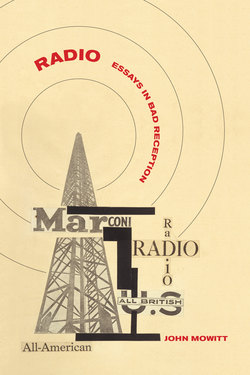Radio

Реклама. ООО «ЛитРес», ИНН: 7719571260.
Оглавление
John Mowitt. Radio
Contents
Отрывок из книги
THE FLETCHER JONES FOUNDATIONHUMANITIES IMPRINT
The Fletcher Jones Foundation has endowed this imprint to foster innovative and enduring scholarship in the humanities.
.....
Chapter 2, “On the Air,” extends this rethinking of the Frankfurt School encounter with radio by tracing how the problem posed by it arises in the philosophy of Marxism, especially as this last came to be thematized in the confrontation between Georg Lukács and Jean-Paul Sartre and the collaboration between Bertolt Brecht and Walter Benjamin. As the chapter title suggests, the interplay between using radio as a means of philosophical and/or political communication and using radio as a provocation to philosophical and/or political thought—what I seek to render in the prepositional instability of the “on”—serves as a tracking device.
Further elaborating the political questions stirred by the radiophonic encounter between Marxism and phenomenology, chapter 3, “Stations of Exception,” turns to Frantz Fanon, whose brilliant and far-reaching essay “Here Is the Voice of Algeria,” from A Dying Colonialism, obliges us to revisit many of the keywords—resistance, voice, people, nation—put in play by the movement of decolonization in Africa and elsewhere. Once on the proverbial table, the role of radio in revolutionary struggles prompts considerations of policy and piracy that urge one to think twice about the status of the voice in the political confrontation with contemporary neoliberalism, especially as it informs thinking about communications.
.....